Key takeaways:
- Emotional intelligence enhances communication and fosters empathy, improving personal and professional relationships.
- Key components include self-awareness, self-regulation, social awareness, and relationship management, which together facilitate effective interactions.
- Practicing strategies like mindfulness, active listening, and expressing gratitude can significantly boost emotional intelligence in daily life.
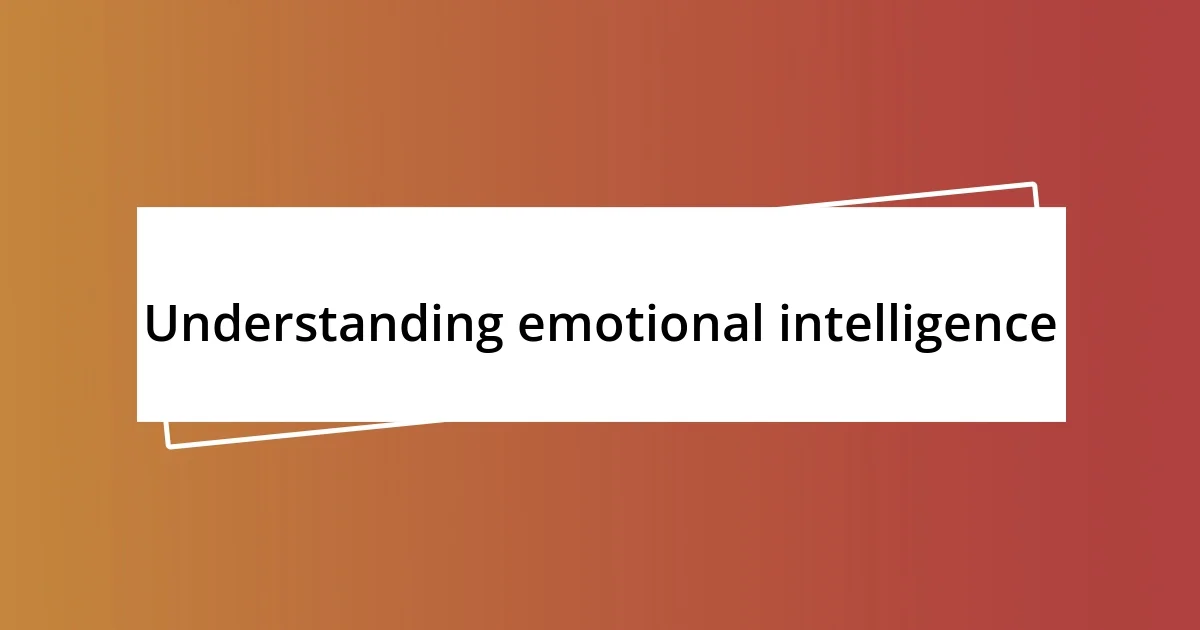
Understanding emotional intelligence
When I first began exploring emotional intelligence, I realized it encompasses not just recognizing our own emotions, but also understanding others’ feelings. I remember a situation with a colleague who seemed upset but hadn’t said a word. At that moment, I wondered, how often do we miss these emotional cues in our daily interactions?
Emotional intelligence can transform our communication. For instance, during a challenging project, I chose to approach a teammate with empathy rather than frustration. Instead of merely addressing the work, I acknowledged their stress, which opened up a genuine dialogue. Isn’t it fascinating how a little understanding can shift the dynamic of a conversation?
Seeing emotional intelligence in action is powerful. I once attended a workshop where we practiced active listening. It was incredible to witness how simply reflecting back what others expressed made them feel valued. This experience made me wonder, just how much more could we achieve if we applied emotional intelligence in every interaction?
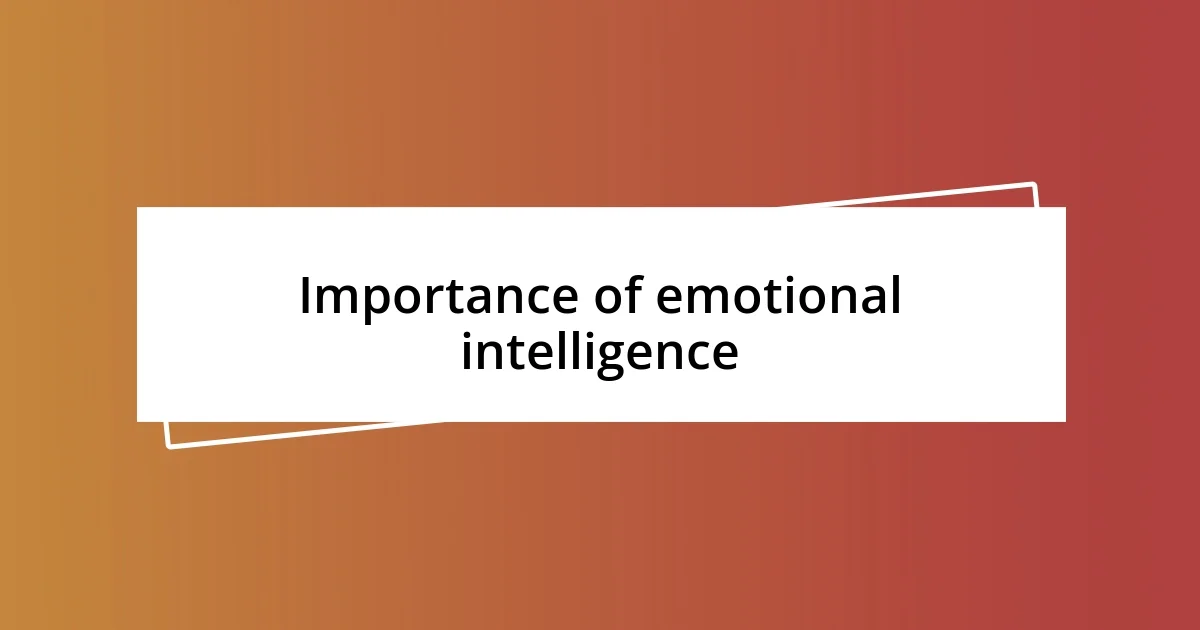
Importance of emotional intelligence
Emotional intelligence plays a vital role in both personal and professional relationships. I remember my first leadership role; I realized that understanding my team’s emotions made a significant difference in our collaboration. By recognizing when someone was feeling overwhelmed, I could step in and offer support, fostering a sense of trust and openness that enhanced our collective productivity.
- It enhances communication, allowing for clearer expression of thoughts and feelings.
- High emotional intelligence fosters empathy, helping us to connect with others on a deeper level.
- It aids in conflict resolution, as we can approach disagreements with understanding rather than hostility.
- This quality is linked to better mental health since recognizing emotions can lead to improved self-regulation and coping strategies.
- Ultimately, emotional intelligence can lead to improved leadership skills, making individuals more effective in guiding and inspiring others.
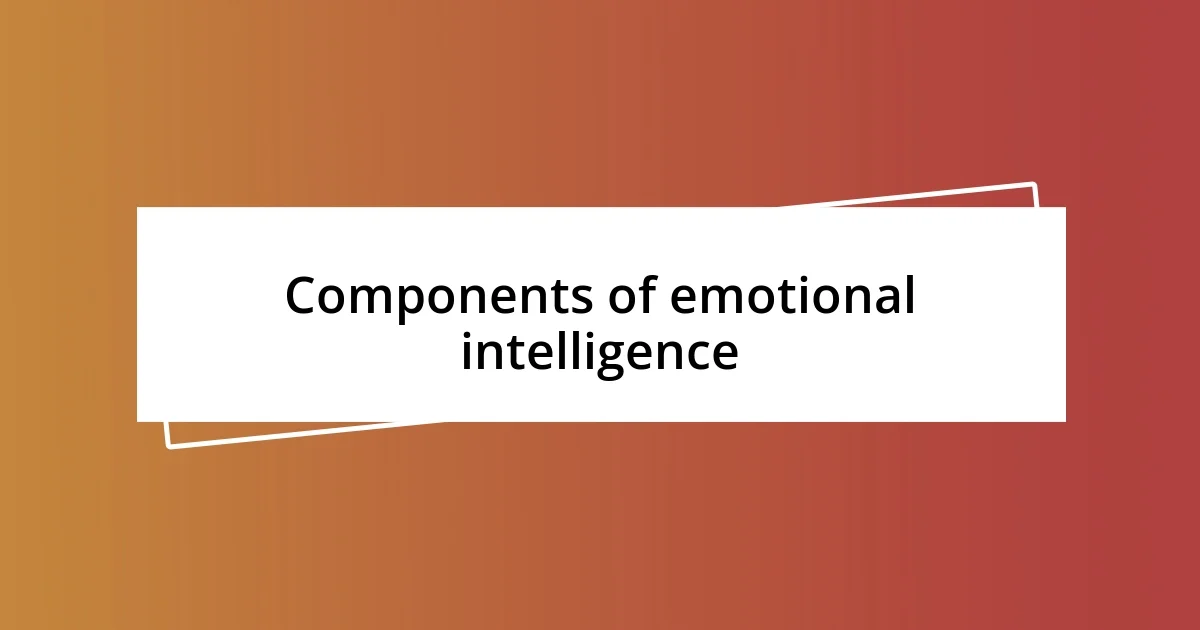
Components of emotional intelligence
Emotional intelligence consists of several key components that interact in meaningful ways. The primary elements are self-awareness, self-regulation, social awareness, and relationship management. I remember when I first recognized my emotional state during a high-pressure meeting; understanding my stress allowed me to remain calm and focused. This moment highlighted how self-awareness can significantly affect our interaction with others.
While self-awareness stems from acknowledging our feelings, self-regulation is about managing those emotions effectively. I once struggled with impulse reactions during discussions. But as I honed my self-regulation skills, I found that pausing before responding led to more constructive conversations. It’s almost like hitting the pause button on our emotions, giving us the clarity to choose our reactions intentionally.
Social awareness and relationship management are interrelated and immensely valuable. I recall a time when a friend expressed anxiety about an upcoming presentation. By being socially aware, I could empathize with her feelings and provide support that truly resonated. Relationship management involves leveraging this empathy to foster positive connections, which can significantly enhance collaboration and teamwork. These components not only pave the way for personal growth but also strengthen our interpersonal relationships.
| Component | Description |
|---|---|
| Self-awareness | Recognizing one’s emotions and their impact |
| Self-regulation | Managing emotions and reactions effectively |
| Social awareness | Understanding others’ emotions and perspectives |
| Relationship management | Building and maintaining healthy relationships |
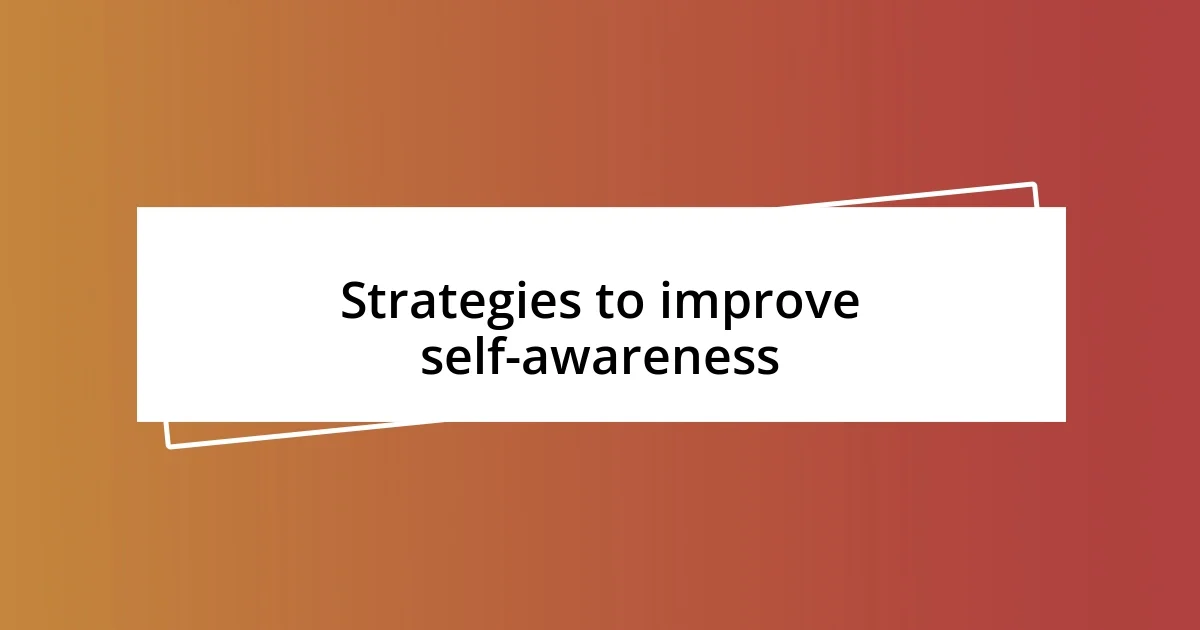
Strategies to improve self-awareness
To improve self-awareness, keeping a personal journal can be incredibly effective. I’ve found that jotting down my thoughts and feelings allows me to reflect on my emotional patterns. Have you ever noticed how writing can sometimes clarify what’s swirling in your mind? It’s like putting a spotlight on your emotions—you start to see connections and triggers you might not have realized before.
Mindfulness practices, such as meditation or deep-breathing exercises, can really help too. I recall starting a simple mindfulness routine where I’d take a few minutes each day to focus solely on my breath. Over time, I became more attuned to my internal state, noticing when stress levels spiked or when I was particularly relaxed. This kind of attention helped me respond to my emotions rather than react impulsively.
Seeking feedback from trusted friends or colleagues is another powerful strategy. I once asked a mentor about how I came across in meetings, and their insights were eye-opening. Constructive feedback not only sheds light on blind spots but also reinforces my understanding of how my emotions affect others. Isn’t it fascinating how others can help us see ourselves more clearly? This exchange can foster a richer understanding of oneself and contribute to lasting self-awareness.
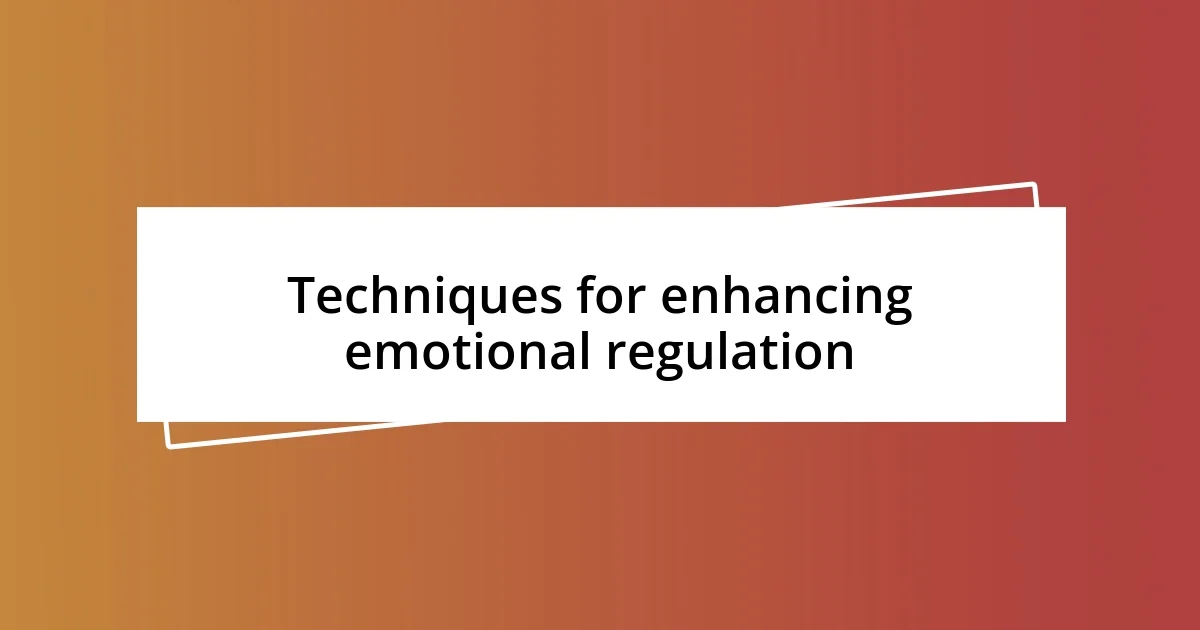
Techniques for enhancing emotional regulation
One effective technique for enhancing emotional regulation is implementing deep-breathing exercises. I learned this when I faced an emotionally charged situation at work. As I took slow, deliberate breaths, I felt my anxiety recede, enabling me to approach the situation with a clearer mind. Have you ever tried this in a tense moment? It’s astonishing how something so simple can ground us, allowing space for thoughtful responses rather than knee-jerk reactions.
Another method I’ve found invaluable is the practice of cognitive reappraisal. This involves reframing negative thoughts to promote a more positive outlook. I remember a time when I misinterpreted a friend’s silence as disinterest. Instead of jumping to conclusions, I stopped to consider other possibilities. She was simply deep in thought! This shift in perspective not only calmed my initial anxiety but also improved our conversation. How often do we let our emotions lead us astray without taking a moment to reassess the situation?
Finally, creating a personal emotional toolkit can be a game changer. This might include activities that bring you joy or help you decompress, like going for a walk or listening to your favorite music. I’ve crafted my own toolkit with items that make me feel more composed. When I get overwhelmed, revisiting this collection reminds me of the things that anchor me. Don’t you think it’s empowering to have strategies ready at hand for those unpredictable emotional waves?
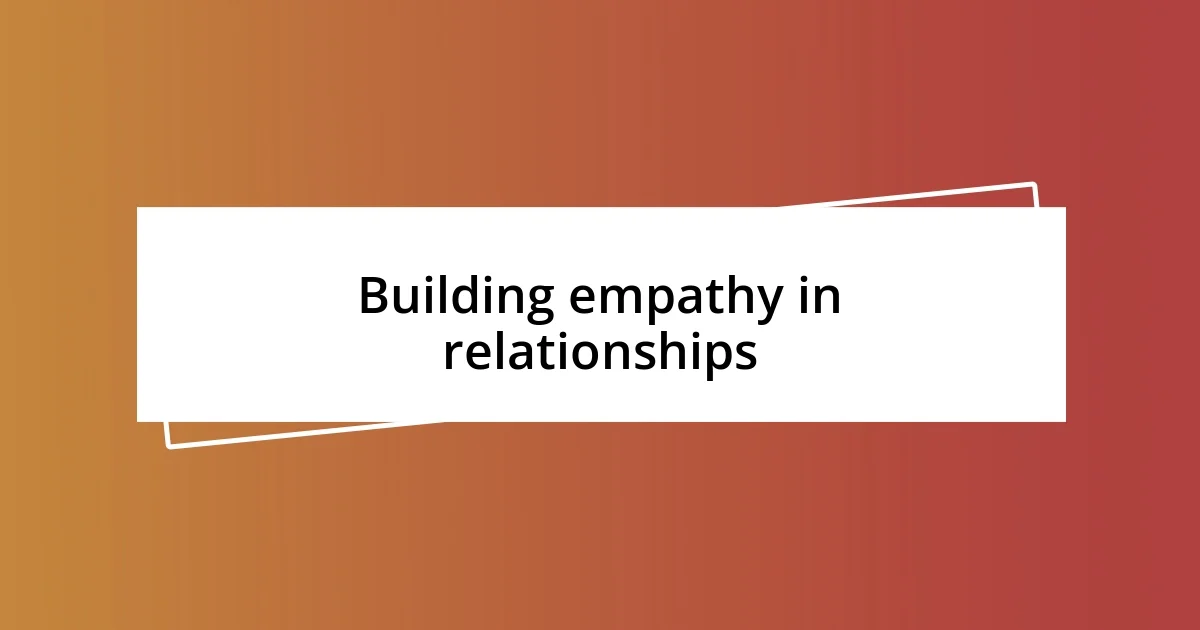
Building empathy in relationships
Building empathy in relationships is a journey I actively embark on. I remember a time when a close friend was going through a rough patch, and I realized I needed to step back and really listen. Instead of offering immediate solutions, I focused on understanding her feelings. Have you ever found yourself just waiting for your turn to talk? By practicing attentive listening, I learned how important it is to validate someone else’s experiences. It deepens connections in ways we often overlook.
Another valuable lesson came to me during a group project. There was a moment of conflict when opinions clashed. Instead of pointing fingers, I encouraged everyone to share how they felt about the situation. This small act of openness transformed our heated debate into a constructive conversation. It became evident how powerful it is to create a safe space for sharing emotions. Do we sometimes forget that empathy can diffuse tension and foster collaboration?
I’ve also started to pay attention to non-verbal cues, which can speak volumes in a conversation. One evening, while spending time with family, I noticed my sister’s withdrawn posture. I could tell something was bothering her. Rather than waiting for her to open up, I gently asked if she wanted to talk. It’s fascinating how the unspoken can reveal just as much as words. Don’t you think being attuned to these signals can enrich our relationships and lead to a deeper understanding of those we care about?

Applying emotional intelligence in daily life
Applying emotional intelligence daily is transformative in countless ways. For instance, I recall a busy day at work when an unexpected setback really threw me off balance. Instead of succumbing to frustration, I paused to reflect on my own emotions. This self-awareness allowed me to regroup and address the issue constructively. How can you integrate moments of reflection into your daily challenges?
Furthermore, I’ve found that expressing gratitude can significantly enhance emotional intelligence in relationships. Recently, I took a moment to write a thank-you note to a colleague who had supported me during a project. It was a simple gesture, yet it deepened our connection and made both of us feel valued. Have you noticed how acknowledging others can strengthen your own emotional well-being?
Lastly, I believe sharing my experiences can invite others to open up as well. During a casual dinner with friends, I shared a vulnerable moment from my past, which unexpectedly led to a heartwarming discussion on our experiences. It struck me how honesty fosters trust and intimacy; have you ever felt that sense of relief when someone else shares their struggles? By allowing ourselves to be authentic, we create spaces where others feel safe to do the same.













